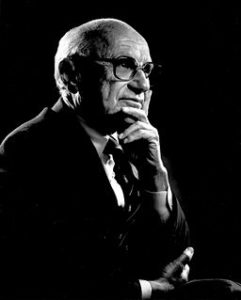
The Economist has an article discussing research on the link between the housing cycle and the investment cycle:
The housing market has generally been both a reliable predictor of downturns and, frequently, a proximate cause. Serious housing troubles preceded nine of the 11 recessions between the end of the second world war and the start of 2020. One exception is the dotcom bust, which was preceded by only a modest housing slump. The other is the recession of 1953, which was triggered by demobilisation after the Korean war. Here housing was a completely innocent bystander.
In the Keynesian model, investment shocks drive the business cycle. But there’s actually little evidence for that claim, as in almost any business cycle model the investment sector will be highly procyclical. Milton Friedman‘s “permanent income hypothesis” predicts that people will tend to smooth consumption over time, as their income fluctuates. Think of a farmer that earns $40,000 in bad years and $100,000 in good years. The farm family may consume each year as if their income were $70,000/year.

Friedman’s model predicts that consumption will be less cyclical than average, which means that investment will be more cyclical than average. Even during recessions, consumption spending on food, clothing, haircuts, education, health care, etc., will dip only slightly, even as spending on houses and business equipment falls sharply.
Most recessions (excluding the present slump) are caused by tight money, which reduces NGDP growth. Because nominal wages are sticky in the short run, employment falls when NGDP falls. This reduces national output and national income. Consumption smoothing causes the fall in output to fall disproportionately on the investment sectors (residential and business.)
Housing is almost always an “innocent bystander”, not the actual cause of recessions.

READER COMMENTS
marcus nunes
Jul 27 2020 at 5:23pm
Some years ago, Ed Leamer wrote “Housing is the business cycle”. Tha abstract:
Of the components of GDP, residential investment offers by far the best early warning sign of an oncoming recession. Since World War II we have had eight recessions preceded by substantial problems in housing and consumer durables. Housing did not give an early warning of the Department of Defense Downturn after the Korean Armistice in 1953 or the Internet Comeuppance in 2001, nor should it have. By virtue of its prominence in our recessions, it makes sense for housing to play a prominent role in the conduct of monetary policy. A modified Taylor Rule would depend on a long-term measure of inflation having little to do with the phase in the cycle, and, in place of Taylor’s output gap, housing starts and the change in housing starts, which together form the best forward-looking indicator of the cycle of which I am aware. This would create pre-emptive anti-inflation policy in the middle of the expansions when housing is not so sensitive to interest rates, making it less likely that anti-inflation policies would be needed near the ends of expansions when housing is very interest rate sensitive, thus making our recessions less frequent and/or less severe.
Much better to just try to keep NGDP on a stable level path!
David Henderson
Jul 27 2020 at 5:35pm
Scott,
You write:
Average what?
Matthias Görgens
Jul 28 2020 at 12:14am
Than the average component of GDP?
Scott Sumner
Jul 28 2020 at 2:06am
Yes, that was poorly worded. I meant less cyclical than overall GDP.
David Henderson
Jul 28 2020 at 12:42pm
Thanks.
Kevin Erdmann
Jul 27 2020 at 5:49pm
I think this is one way to explain the scale of the Great Recession. Imagine asking the question, “What would happen if there was a strong and reliable leading indicator of cyclical contraction, and a public consensus developed that that indicator should reasonably, even morally, behave in exactly the way that signals contraction?”
The answer to that question, posed hypothetically, seems obvious.
At each meeting of the FOMC, the “Greenbook” includes a forecast of housing starts. From early 2006 to the end of 2008, between each meeting, housing starts would decline sharply from their previous level. At each meeting, Fed economists would lower the forecast in line with recent declines, and project starts to remain at the new level indefinitely.
What this suggests is that the Fed didn’t intend to create a cyclical crisis. They didn’t forecast declining starts. But, as one developed, instead of reacting to this increasingly extreme signal of contraction by counteracting it, they seem to have taken it as evidence that their critics were right, that there was an oversupply of housing, and that their previous policy stances were partly to blame by being too stimulative.
One of their most prominent critics, John Taylor, had argued at Jackson Hole in August 2007 that previous Fed stimulus had led to overbuilding. He estimated the excess supply to be about 1 million units. Even accepting his estimate of the appropriate supply of homes, Fed forecasts at the FOMC meeting preceding that presentation already projected starts to decline enough to reverse more than half that supply by the end of 2008. By December, the forecast projected a complete reversal of the supposed oversupply by the end of 2008.
By the end of 2008, the cumulative number of housing units implied by their forecast to the end of 2011 was about 5 million units below the number implied by the approx. 1.7 million annual rate estimated by Taylor. Finally, in late 2008, they tentatively started forecasting a slow recovery in housing starts. In 2011, Ben Bernanke reported that residential investment was still a drag on economic growth because we were still working off excess supply.
There is probably some sort of Robin Hanson / Yogi Berra lesson here. Something like, “The most surprising crises are the ones everyone saw coming.”
Knut P. Heen
Jul 28 2020 at 9:14am
Why isn’t tight money also a consequence of the recession?
People start withdrawing money from the bank to smooth consumption when the recession hits. In your example, people deposit $30,000 in a good year (selling surplus grain) and withdraw $30,000 in a bad year (buying deficit grain). The counter party is a grain speculator who buys cheap grain (good year), stores it, and sells dear grain (bad year). A bank takes the deposit from the farmer and lends it to the speculator. The result is that the bank’s balance sheet expands during a good year and contracts during a bad year. In order for the speculator to make money from the operation, the price differential between the good year and the bad year must be large enough to cover storage costs and interests.
The true cause of the recession in the farmer model is a negative supply shock due to bad weather (correlated across farms). The Year Without a Summer (1816) produced an 8-fold increase in the price of oats (horse fuel) because the harvest was only between 1/3 and 1/2 of a normal year. The cause of the bad weather was the eruption of Mount Tambora (1815). This was the first time Sunspots were visible to the naked eye because of dimmed sunlight, hence the Sunspot theory of business cycles was born.
Benoit Essiambre
Jul 28 2020 at 11:50am
That’s the monetary catch-22 isn’t it?
Exactly when the average person starts to believe that private asset returns won’t be what they had hoped for, that these returns might not cover their future expenses, that they better save more money and safe bonds, exactly when people try to shift their assets into something that will more reliably allow them to maintain future consumption without working more,
at that very moment, economic activity shifts away from investment and towards immediate consumption thus reducing resources going into efforts to maintain future consumption.
It’s people trying to save more, causing them to collectively save less. They stop building real physical wealth and start hoarding promises that they’ll just owe each other, that will just cancel out.
Comments are closed.